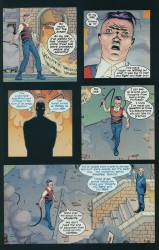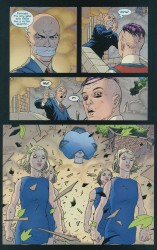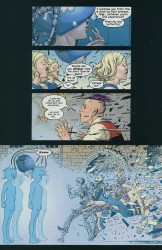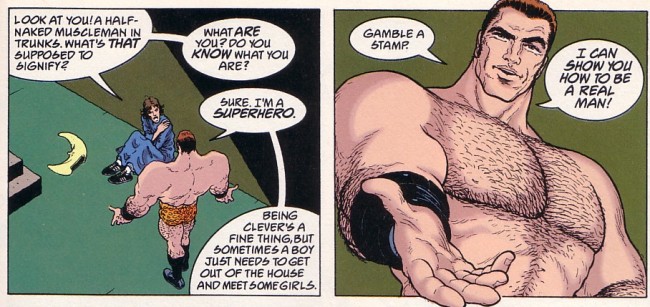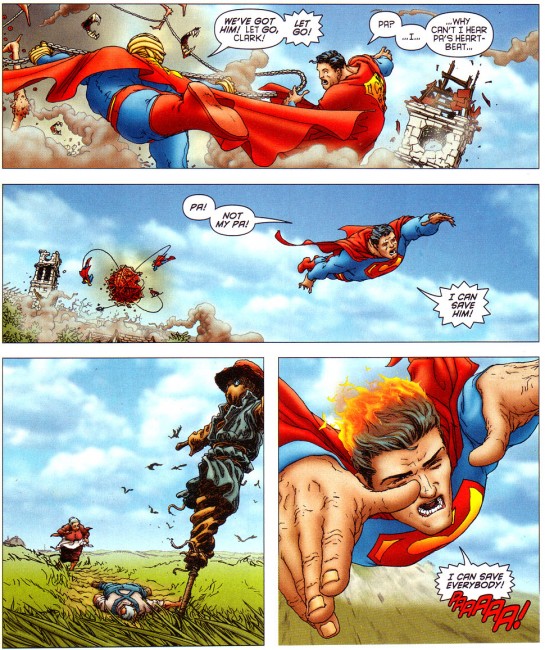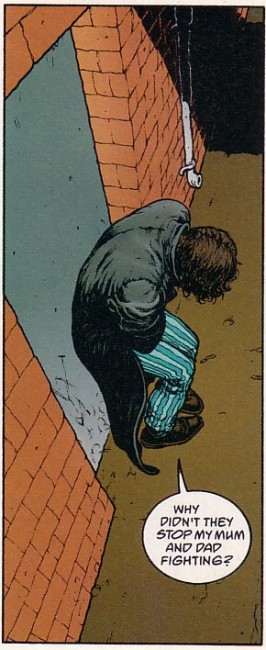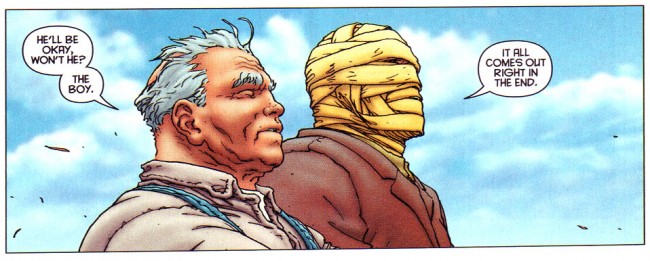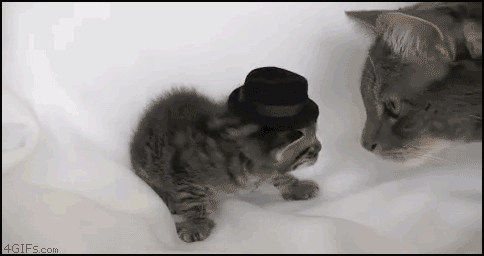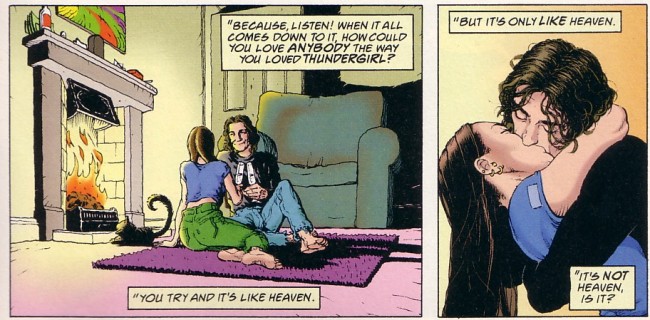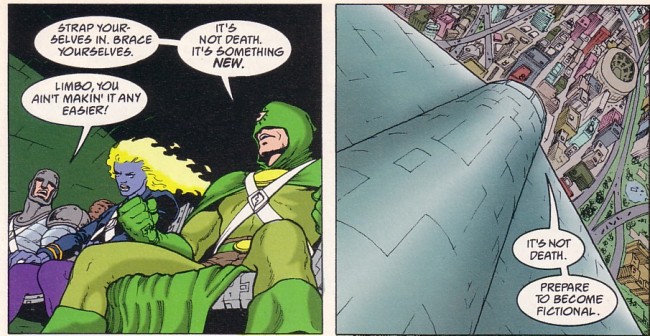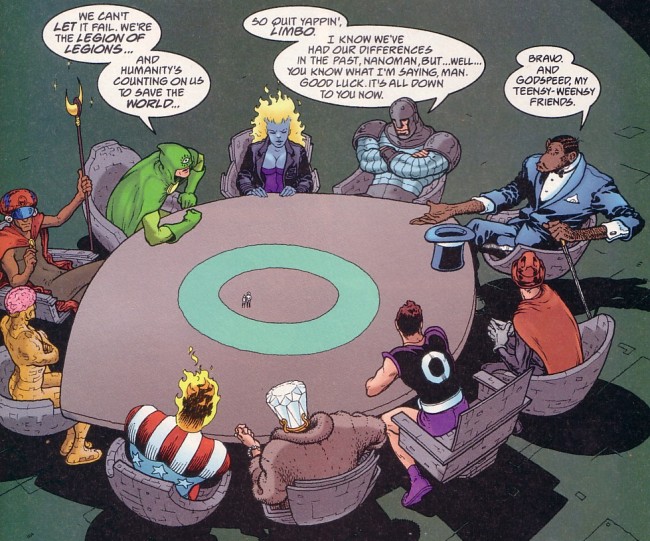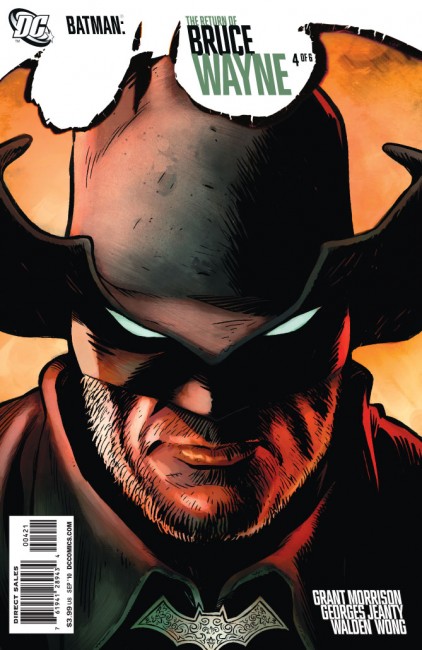I wanted to start this post about race and comics with this:
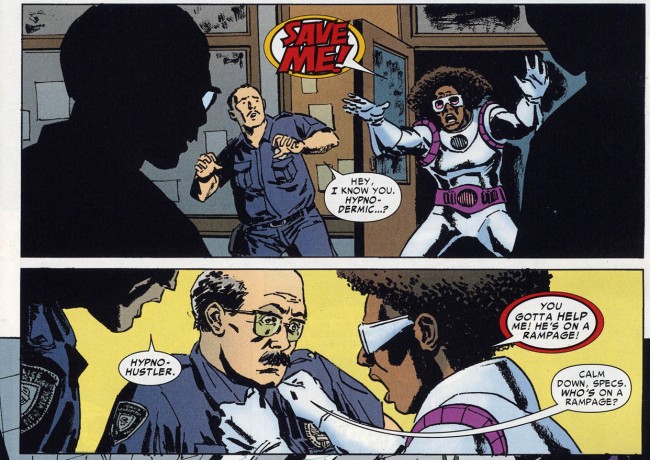
because, cripes, that’s Hypno Hustler, hands down my favorite obscure comics character and Mark Waid and Paul Azaceta brought him back. It’s also a funny macro for black characters in comics. Do you get it? Next would be this:
Black Batman: Bruce Wayne won’t franchise in urban markets
Black Panther: Stuck in dumb, unforgiveably boring comics
The Boondocks: Gone forever
Brother Voodoo: Brother Who?
Chalky White: Not given nearly enough screen-time, inexplicable fascination with not building bookcases
Garterbelt: Drawn with stereotypically huge lips, pedo priest
Menace: Tragic Mulatto, single mother
Lebron James: Worse than Hitler
Luke Cage: Would rather hang out at prison than with his White Wife and Mixed Baby
Power Man: Does Dominican count as black?
Robin: Still not black
Storm: smh
Turk: Needs to stop snitching
War Machine: Who cares?
But, the thought of pretending like I care that Brother Voodoo bit it in some comic I didn’t read gives me a migraine and I’m all out of jokes. Instead, though, I’m going to do this:
was a hero to most
I can’t get into Will Eisner’s
The Spirit. I’ve tried a fistful of times. I bought a trade, thinking that putting money down would force me to plow through it. It didn’t. I can’t get past Ebony White. He’s a roadblock that I can’t get around.
I get the excuses and explanations. It was the humor of the time, Eisner didn’t know any better, he didn’t really mean it, Ebony was actually helpful, he was heroic in his own way, and a credit to his race. Blah blah blah. Eisner is a legend, and you don’t really want to tar his past with accusations of racism, do you? The Spirit is a classic, a titan in the medium! It’s hugely influential, so surely you can let this minor issue pass? It’s not really racism, is it?
But if it talks like a duck and looks like a pickaninny and drives Miss Daisy? Then it’s a slap in the face, and who consents to being slapped?
The issue of Ebony White is minimized in favor of the ongoing stature of The Spirit. It’s obviously an issue, since the two most recent relaunches of The Spirit have adjusted the character to be more palatable. Miller didn’t even put him in the movie, presumably because he knew that Ebony was a hard sell. Brian Azzarello turned her into a sassy black girl for the First Wave books. (Better “Nuh-uh nigga I ain’t going in there you better ask somebody else to do that nuh-UH” than “Yessuh boss whateva you say, boss.” That’s progress, innit?) But Ebony, the character, is minimized in favor of The Spirit, the classic. Don’t let racism ruin this great thing.
puffin newports ’cause life’s a bitch, and it’s too short
You can see maximization in the cases of OJ Simpson and Mike Vick. You’d think those two guys were the second and third coming of Charles Manson the way the news and society keeps on about them. Their crimes are maximized to the point where Tucker Carlson can say on tv that Vick should’ve been executed for his crimes. America: where you do the crime and do the time, or get acquitted, and then you keep doing the time because you’re a filthy, filthy convict.
Unless you’re Johannes Mehserle, who got to shoot an unarmed father in the back, get sentenced in November, be eligible for release two months later, and be hailed as a hero and victim of… something.
everything is everything, what is meant to be will be
When I first started writing about race and comics, I feel like I focused on characters. I wanted to celebrate these characters I’d grown up enjoying or learned to enjoy as an adult. “Look! We exist! And we’re not awful!” Time went on and I started to point out the problems. This kind of tone deaf, “this is how black people act in movies, not in real life” sort of thing. I later learned to focus on context. Here is why this bit is good, here is how it relates to real life. Finding the way verisimilitude makes stories better. This year, I tried to focus more on the people creating the comics.
Next year is another Black History Month. Right now, I feel like if I approach any of it from the position of black characters in mainstream comics, I’ll be making a huge mistake. Storm, Black Panther, and Luke Cage can be a useful lens for thoughts about race and comics at times, but by and large? I don’t care any more. What matters are the people who make the books, not these dusty old trademarks.
The problem with superheroes and black folks is that superhero comics used to be children’s comics. The in-text morals and structure are still leagues behind everything else. Maybe it’s because I grew up in a military family, but “heroes don’t kill” is an absurd positon to have and borderline insulting. Plenty of heroes kill. Some of our favorite Americans have killed dozens of people. But, the childlike morality stuck around, so we’re stuck with it. A side effect is that characters have to be very easy to understand.
Superhero comics don’t do nuance well. They do twenty-two pages of fights, yelling, and basic romantic drama well, but subtlety? Nah. And if you expect to be represented as a person, you’re going to need a certain degree of subtlety.
the violence in me reflects the violence that’s around me
It’s not all strange fruit and Al Sharpton in cape comics. Fred Van Lente and Mahmud Asrar’s Shadowland: Power Man was a breath of fresh air, and it’s actually kind of sad that that’s true. Regardless, Van Lente and Asrar knocked the book out of the park, cleverly working in socioeconomic and racial issues that enhanced the story, rather than distracted from the tale. They treated certain things as a given and created something worth reading.
was a breath of fresh air, and it’s actually kind of sad that that’s true. Regardless, Van Lente and Asrar knocked the book out of the park, cleverly working in socioeconomic and racial issues that enhanced the story, rather than distracted from the tale. They treated certain things as a given and created something worth reading.
The more I think about it, the more that Bendis’s Cage strikes me as an amalgamation of various black dudes in movies. It’s like an impersonation. A good one, but just off enough to be noticeable. He takes stands that don’t make sense, is bad with money, and is seemingly written as a Strong Black Man. You know how writers do that, yeah? Like there’s a checklist? Stands by his crew, loves his family, would die for his kids, on and on and on.
Jeff Parker’s work on Thunderbolts consistently impresses me, though. Like Van Lente and Power Man, he writes Cage in a way that clicks for me. When he busts out the black dudeisms like “What’s my name?” it’s not just an empty boast or black braggadocio. There’s a point to it. The bluesman in the Shadowland tie-ins was on point, too, and so was the way Cage deferred to him. It rings true in a way that Cage refusing Captain America’s money doesn’t. It’s about Cage, but it’s bigger than him, too.
These should be the rule, not the exception, but it is what it is.
take sun people, put ’em in atlanta snow
Chris Sims wrote an essay a few months back he called “The Racial Politics of Regressive Storytelling”. To sum it up, and I hope I’m not doing him a disservice by paraphrasing his argument, DC’s thirst for nostalgia has had the unintended side effect of scrubbing some of the non-white characters out of their universe. I think Sims has a point in there, but I don’t know that I agree with the why.
I don’t think that DC is working of nostalgia at all, especially not for the Silver Age. The Silver Age, running from the ’50s up to the early ’70s at the latest, was a time when superhero comics turned soft and transient. Characters changed shape, gimmick, and styles issue to issue. The Silver Age is generally viewed online as being wacky and out-there, super weird and goofy. It isn’t known for Hal Jordan, Barry Allen, and Ray Palmer so much as for that time Superman had an ant head and Jimmy Olsen married a gorilla. Jordan, Allen, and Palmer date from those times, yes, but they aren’t emblematic of those times.
If you skip across the street to Marvel, there’s an interesting parallel. Over the past ten years, several characters from the ’70s have made a return. They haven’t replaced anyone, but Luke Cage, Misty Knight, Werewolf by Night, Moon Knight, Spider-Woman, Nova, Iron Fist, Ghost Rider, Shang-Chi, and even Howard the Duck have made returns, no matter how completely unmarketable they may be. Does that count as nostalgia for the ’70s?
I don’t think that either situation counts as nostalgia. There is certainly someone’s fond memories of a character involved in the process, but nostalgia is a yearning for, and sometimes emulation of, the past. Quentin Tarantino’s Jackie Brown is a love letter to blaxploitation films. The casting of Pam Grier, the soundtrack, and all the overt references to blaxploitation is proof positive.
If you look at Bendis’s Cage or Geoff Johns’s Hal Jordan, and I mean really look at them, you’d see how they aren’t really fueled by nostalgia at all. The stories aren’t even remotely the same. They star the same characters, sure, but casting Pam Grier alone does not a blaxploitation movie make. Johns’s Green Lantern is deadly serious and never boring. The goofy ring structures, the giant boxing gloves and baseball bats, have largely given way to airplanes and detailed rifles. It’s realistic, rather than whimsical. His Flash comes a little closer to emulating the Silver Age style, but even then, he’s taking one part of the past (the Flash Facts/science) and applying it to something new (giving us stories that let Francis Manapul show us how cool superspeed is). The characters are old. The stories aren’t.
I haven’t read the recent stories with Ray Palmer and Hawkman, but I imagine that those are the same. Old characters, new stories. I know Hawkman in Brightest Day is caught up in some kind of insane recap/readjustment of his history, like Grant Morrison’s “Every Batman story is true” mandate. That doesn’t sound like nostalgia to me. It sounds like cape comics. It sounds like entropy. And with the way the comic industry is right now, it’s inevitable.
Cape comics are a closed system at this point. They cannot grow. This means that the only place left to go with these characters is to flip them. We’re in the remix era of superheroes, and we have been for years, probably ever since Grant Morrison’s New X-Men . Morrison took every crappy old X-Men concept, from sentinels to the Phoenix to Magneto to the New Mutants, and made it brand new. Superheroes have to take a page from William S Burroughs and create cut-up comics. Take this bit of history, match it with the other bit, and make something new. The fanbase is fiercely conservative and only want known quantities.
. Morrison took every crappy old X-Men concept, from sentinels to the Phoenix to Magneto to the New Mutants, and made it brand new. Superheroes have to take a page from William S Burroughs and create cut-up comics. Take this bit of history, match it with the other bit, and make something new. The fanbase is fiercely conservative and only want known quantities.
Disagree? Look at Paul Cornell’s Action Comics, Morrison’s Batman, Johns’s Green Lantern, Bendis’s Avengers empire (especially Prime and whichever one JRjr was drawing), Brubaker’s Captain America, Matt Fraction’s Invincible Iron Man, and Fraction’s Uncanny X-Men. All of those are pulling ideas that are thirty, forty, sixty years old into the modern day and telling new stories with them. Taking the past and remixing it, updating it for a new era.
Cut-up Comics! The cover of New Gods 1 with “Kirby Is Here!” scratched out and “DJ Premier Is On The Wheels of Steel!” written in. Spider-Man twisted and turned through a new lens! Watch as the past is reinvented by way of public execution on the comics page!
This is something that only cape comics can do. If you take Kirkman’s The Walking Dead and try it, do you know what you get? Re-hash. It’s too small, too new, for that to work. Superheroes, though, are perfect for it. It’s the only way they’ll survive. Consumers don’t want new heroes. The market has proven its hostility to books that don’t fit within a certain shape. Fine–play with what sits inside that shape. Four walls can be a prison or a lab. Choose one.
y’all probably done forgot about her. but i ain’t gonna ever forget.
Remember earlier this year when the new Aqualad was announced and half the online commentary was, “Oh, so now we get BLACK Aqualad? Blaqualad?” and the other half was “Oh, so he’s AFRAID OF WATER, huh, he CAN’T SWIM? Is that how it is?”
Yeah. I see you. Do better. Be better.
a colored life still ain’t worth but a few ducats
Right now is still the best time to be black in cape comics. Cage is headlining a couple of books, Black Panther keeps getting tries at bat, Steel is kicking off and probably dying in an event next year, DC’s new Aqualad seems cool (he was dope on the show and pretty straight in the comics), Black Panther’s little sister has her own miniseries… things don’t suck. They could be better, though.
I got a letter from a third-tier company’s PR rep a few months back. Not a personal one, just your usual PR crap. It mentioned that there had been criticism online about there not being enough “diverse characters,” so they were launching a series starring a black guy.
Point: Cool, someone’s trying to listen to what people are saying.
Counter-point: Man, it’s all just business in the end, isn’t it?


